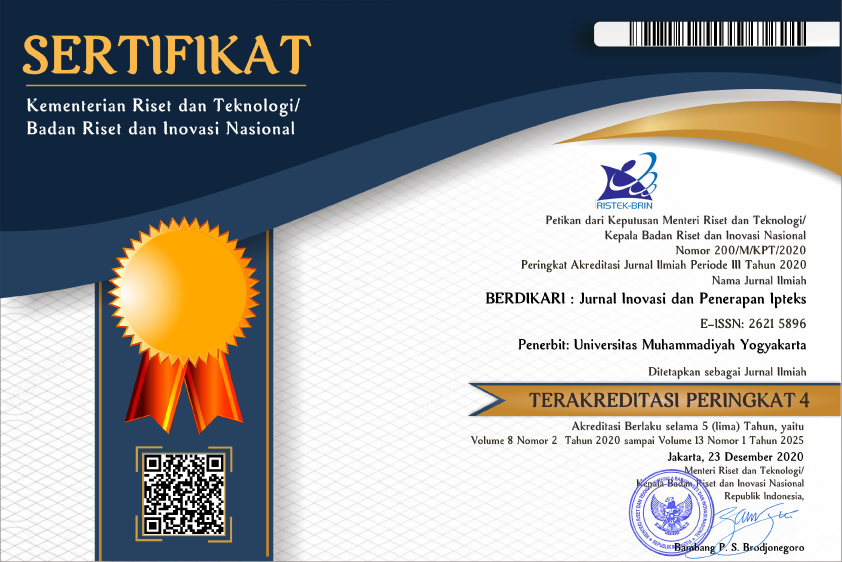Karakter Rasa dan pH Yoghurt Susu Kambing pd lama dan Jenis Starter yang Berbeda
DOI:
https://doi.org/10.18196/bdr.7154Keywords:
Goat Milk Yoghurt, Fermentation Duration, Starter TypesAbstract
Goat milk is one of the commodities of farming products that is highly nutritious and useful for health. However, goat milk has not been currently preferable due to its smell characteristic. One of the ways in order to make goat milk be able to gain consumers’ interests is by turning it into processed product, such as yoghurt. Yoghurt is a drinking product made as the result of milk fermentation yielded from controlled LAB bacteria. This study is the result of organoleptic assessment, in the form of pH and the flavor of one of PUPPIK skim dedicated products. The flavor organoleptic observation with students as the panelists was using de Garmo analytical hedonic test in order to find the most appropriate treatment and the most favorite flavor based on the consumers’ interests. The pH data and data analysis used ANOVA test. The design of this research was RALF (Rancangan Acak Lengkap pola Faktorial/ Factorial Pattern Completely Randomized Design), which consists of 2 factors: fermentation duration (6, 12, 18, and 24 hours) with the temperature of 37OC and the types of starter bacteria (Streptococcus thermophilus, Lactobacillus bulgaricus and combination). Therefore, there were 12 treatments which were repeated 3 times.The result of de Garmo test observation is that the fermentation duration interaction and types of starter bacteria which is mostly preferred by the panelists is the one which is in 24-hour duration of fermentation using Lactobacillus bulgaricus bacteria, with the highest flavor product score of 1,89 (little sour, not bitter), while in term of pH, there is no difference.References
Ayustaningwarno, F. 2014. Teknologi Pangan, Teori
Praktis dan Aplikasi. Graha Ilmu: Yogyakarta.
Elok, N. H. 2012. “Pembuatan Yoghurt Jambu Biji
Merah (Kajian Penambahan Sari Jambu Biji Merah
terhadap Sifat Fisik, Kimia dan Organoleptik).”
Skripsi, Fakultas Teknologi Pertanian Universitas
Brawijaya. Malang.
Gianti, S dan Herly, E. 2011. “Pengaruh Penambahan
Gula dan Lama Penyimpanan Terhadap Kualitas
Fisik Susu Fermentasi.” Jurnal Ilmu dan Teknologi
Hasil Ternak.
Hidayat, Nur, Masdiana dan Sri Suhartini, 2006.
Mikrobiologi Industri. Penerbit Andi: Yogyakarta.
Intermediate Technology Development Group. 2003.
Yoghurt Production. www.itdg.org/docs/
technical_information_service/yoghurt. (Diakses 9
Januari 2016)
Moeljanto, Rini D. dan Wiryanta, Bernadus T.W.,
Khasiat dan Manfaat Susu Kambing:Susu
Terbaik dari Hewan Ruminansia. PT. Agromedia
Pustaka: Jakarta
Nindita, P. I. 2012. “Pembuatan Yoghurt Sari Buah (
Kajian Penambahan Konsentrasi dan Jenis Sari
Buah Tomat, Melon, Jambu dan Stroberi) Terhadap
Kualitas Fisik, Kimia dan Organoleptik.” Skripsi
.Fakultas Teknologi Pertanian Universitas Brawijaya.
Malang.
Setiano, C. Y, Yoyok. B. P dan S. Mulyani. 2014. “Nilai
pH, Viskositas, dan Tekstur Yoghurt Drink dengan
Penambahan Ekstrak Salak Pondoh (Salacca
zalacca).” Jurnal Aplikasi Teknologi Pangan 3 (3)
Silvia, 2002. “Pembuatan Yoghurt Kedelai (Soyghurt)
dengan Menggunakan Kultur Campuran
Bifidobacteriumbifidum dan Stertococcus
thermopillus.” Skripsi S-1 Prodi Biologi. ITB. Bogor.
Winaro, F. G dan I. E. Fernandez. 2007. Susu dan
Produk Fermentasinya. M-Brio Press: Bogor.
Zain, W. N. H., 2013. “Kualitas Susu Kambing Segar
di Peternakan Umban Sari dan Alam Raya Kota
Pekanbaru.” Skripsi. Fakultas Pertanian dan
Peternakan UIN Syarif Kasim Riau.
Downloads
Published
Issue
Section
License
Copyright
Authors retain copyright and grant BERDIKARI Jurnal Inovasi dan Penerapan IPTEK the right of first publication with the work simultaneously licensed under an Attribution 4.0 International (CC BY 4.0) that allows others to remix, adapt and build upon the work with an acknowledgment of the work's authorship and of the initial publication in BERDIKARI Jurnal Inovasi dan Penerapan IPTEK.
Authors are permitted to copy and redistribute the journal's published version of the work (e.g., post it to an institutional repository or publish it in a book), with an acknowledgment of its initial publication in BERDIKARI Jurnal Inovasi dan Penerapan IPTEK
License
Articles published in the BERDIKARI Jurnal Inovasi dan Penerapan IPTEK) are licensed under an Attribution 4.0 International (CC BY 4.0) license. You are free to:
- Share — copy and redistribute the material in any medium or format.
- Adapt — remix, transform, and build upon the material for any purpose, even commercially.
This license is acceptable for Free Cultural Works. The licensor cannot revoke these freedoms as long as you follow the license terms. Under the following terms:
- Attribution — You must give appropriate credit, provide a link to the license, and indicate if changes were made. You may do so in any reasonable manner, but not in any way that suggests the licensor endorses you or your use.
- No additional restrictions — You may not apply legal terms or technological measures that legally restrict others from doing anything the license permits.




